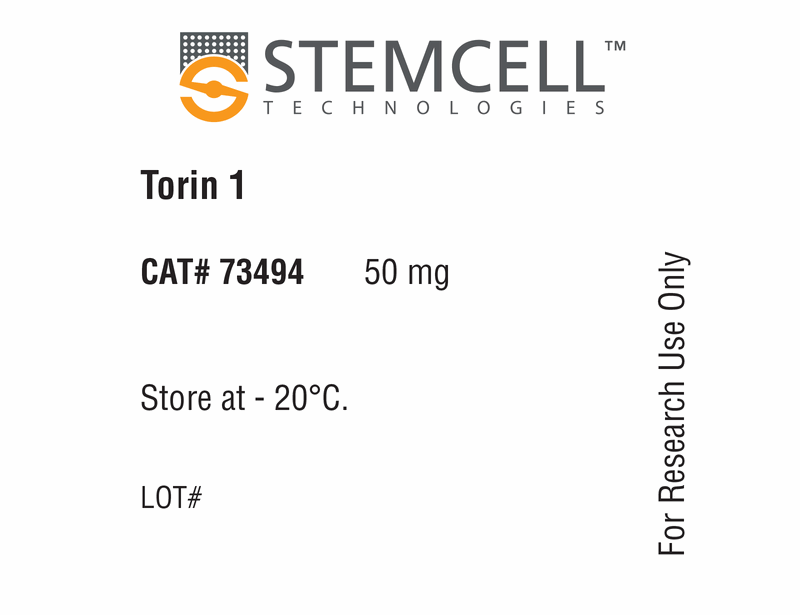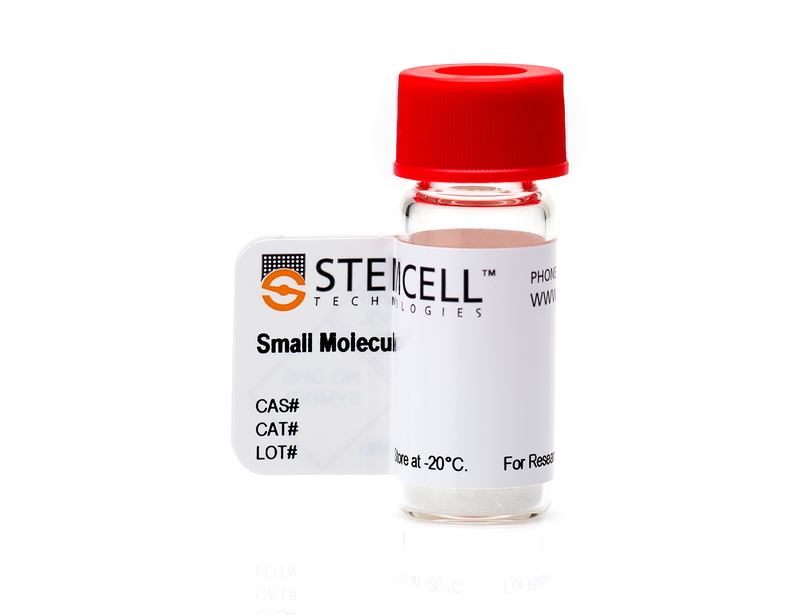概要
Torin 1 is an ATP-competitive inhibitor of the mammalian target of rapamycin (mTOR), inhibiting the mTOR complexes mTORC1 and mTORC2 with IC₅₀ values of 2 and 10 nM respectively. It is selective for mTOR versus a panel of over 400 other kinases screened at 10 µM (Thoreen et al.; Liu et al.).
CANCER RESEARCH
· Inhibits tumor growth, likely through a cytostatic rather than cytotoxic mechanism, in a U87MG PTEN-null glioblastoma mouse xenograft model (Liu et al.).
· Hinders growth, motility, invasion, and survival of primary colon cancer stem-like cells in vitro, and suppresses tumor growth but does not affect normal colon stem cells in xenografts (Francipane & Lagasse).
CANCER RESEARCH
· Inhibits tumor growth, likely through a cytostatic rather than cytotoxic mechanism, in a U87MG PTEN-null glioblastoma mouse xenograft model (Liu et al.).
· Hinders growth, motility, invasion, and survival of primary colon cancer stem-like cells in vitro, and suppresses tumor growth but does not affect normal colon stem cells in xenografts (Francipane & Lagasse).
技术资料
| Document Type | 产品名称 | Catalog # | Lot # | 语言 |
|---|---|---|---|---|
| Product Information Sheet | Torin 1 | 73492, 73494 | All | English |
| Safety Data Sheet | Torin 1 | 73492, 73494 | All | English |
数据及文献
Publications (3)
Oncotarget 2013
Selective targeting of human colon cancer stem-like cells by the mTOR inhibitor Torin-1.
Abstract
Abstract
Metastatic colorectal cancer (CRC) is incurable for most patients. Since mammalian target of rapamycin (mTOR) has been suggested as a crucial modulator of tumor biology, we aimed at evaluating the effectiveness of mTOR targeting for CRC therapy. To this purpose, we analyzed mTOR expression and the effect of mTOR inhibition in cancer stem-like cells isolated from three human metastatic CRCs (CoCSCs). CoCSCs exhibited a strong mTOR complex 2 (mTORC2) expression, and a rare expression of mTOR complex 1 (mTORC1). This latter correlated with differentiation, being expressed in CoCSC-derived xenografts. We indicate Serum/glucocorticoid-regulated kinase 1 (SGK1) as the possible main mTORC2 effector in CoCSCs, as highlighted by the negative effect on cancer properties following its knockdown. mTOR inhibitors affected CoCSCs differently, resulting in proliferation, autophagy as well as apoptosis induction. The apoptosis-inducing mTOR inhibitor Torin-1 hindered growth, motility, invasion, and survival of CoCSCs in vitro, and suppressed tumor growth in vivo with a concomitant reduction in vessel formation. Torin-1 also affected the expression of markers for cell proliferation, angio-/lympho-genesis, and stemness in vivo, including Ki67, DLL1, DLL4, Notch, Lgr5, and CD44. Importantly, Torin-1 did not affect the survival of normal colon stem cells in vivo, suggesting its selectivity towards cancer cells. Thus, we propose Torin-1 as a powerful drug candidate for metastatic CRC therapy.
Journal of medicinal chemistry 2010
Discovery of 1-(4-(4-propionylpiperazin-1-yl)-3-(trifluoromethyl)phenyl)-9-(quinolin-3-yl)benzo[h][1,6]naphthyridin-2(1H)-one as a highly potent, selective mammalian target of rapamycin (mTOR) inhibitor for the treatment of cancer.
Abstract
Abstract
The mTOR protein is a master regulator of cell growth and proliferation, and inhibitors of its kinase activity have the potential to become new class of anticancer drugs. Starting from quinoline 1, which was identified in a biochemical mTOR assay, we developed a tricyclic benzonaphthyridinone inhibitor 37 (Torin1), which inhibited phosphorylation of mTORC1 and mTORC2 substrates in cells at concentrations of 2 and 10 nM, respectively. Moreover, Torin1 exhibits 1000-fold selectivity for mTOR over PI3K (EC(50) = 1800 nM) and exhibits 100-fold binding selectivity relative to 450 other protein kinases. Torin1 was efficacious at a dose of 20 mg/kg in a U87MG xenograft model and demonstrated good pharmacodynamic inhibition of downstream effectors of mTOR in tumor and peripheral tissues. These results demonstrate that Torin1 is a useful probe of mTOR-dependent phenomena and that benzonaphthridinones represent a promising scaffold for the further development of mTOR-specific inhibitors with the potential for clinical utility.
The Journal of biological chemistry 2009
An ATP-competitive mammalian target of rapamycin inhibitor reveals rapamycin-resistant functions of mTORC1.
Abstract
Abstract
The mammalian target of rapamycin (mTOR) kinase is the catalytic subunit of two functionally distinct complexes, mTORC1 and mTORC2, that coordinately promote cell growth, proliferation, and survival. Rapamycin is a potent allosteric mTORC1 inhibitor with clinical applications as an immunosuppressant and anti-cancer agent. Here we find that Torin1, a highly potent and selective ATP-competitive mTOR inhibitor that directly inhibits both complexes, impairs cell growth and proliferation to a far greater degree than rapamycin. Surprisingly, these effects are independent of mTORC2 inhibition and are instead because of suppression of rapamycin-resistant functions of mTORC1 that are necessary for cap-dependent translation and suppression of autophagy. These effects are at least partly mediated by mTORC1-dependent and rapamycin-resistant phosphorylation of 4E-BP1. Our findings challenge the assumption that rapamycin completely inhibits mTORC1 and indicate that direct inhibitors of mTORC1 kinase activity may be more successful than rapamycin at inhibiting tumors that depend on mTORC1.

 网站首页
网站首页





